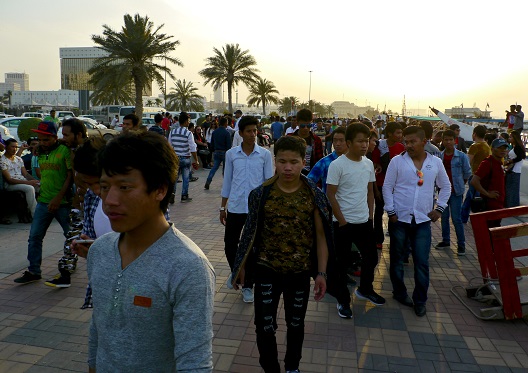 On June 5, Saudi Arabia, the United Arab Emirates, Egypt, and Bahrain severed ties with Qatar amid accusations of supporting terrorism. The Gulf countries closed off borders and airspace to Qatar, and deported Qatari nationals living in their countries, while Qatar’s stock markets plunged in the wake of the rift. The immediate effects on Qatari citizens is clear, but what does this mean for over half of Qatar’s population: its 1.6 million migrant workers?
On June 5, Saudi Arabia, the United Arab Emirates, Egypt, and Bahrain severed ties with Qatar amid accusations of supporting terrorism. The Gulf countries closed off borders and airspace to Qatar, and deported Qatari nationals living in their countries, while Qatar’s stock markets plunged in the wake of the rift. The immediate effects on Qatari citizens is clear, but what does this mean for over half of Qatar’s population: its 1.6 million migrant workers?
Saudi Arabia, the United Arab Emirates, and Bahrain called on citizens residing and working in Qatar to leave and have banned travel to Qatar. The Saudi Arabian News Agency says these policies are intended to protect against “dangers of terrorism and extremism.”
The fate of Egyptian citizens, as well as other citizens of other countries not directly involved in the rift like the Philippines, India, and Nepal remains unclear. While Egyptians working in Qatar expressed concern over being caught up in the political fallout, other countries are concerned about the welfare of their citizens due to the impact the blockade could have on Qatari residents.
Most of Qatar’s food imports are supplied through the border with Saudi Arabia, and the recent blockade caused a rush on grocery stores, leaving shelves empty. While Qatar has sought to quiet concerns regarding food shortages, migrant workers in Qatar will be among the first to feel the pinch if the blockade leads to an increase in prices.
Egypt
Egypt has taken similar measures as the Gulf countries in cutting ties with Doha, including closing airspace and severing diplomatic ties, but the Central Bank has not imposed sanctions on banks and the state has not recalled its workers.
Egypt cut ties with Qatar citing similar reasons as its Gulf counterparts, but the fate of its 200,000 – 350,000 workers—who contributed $1 billion in remittances to the Egyptian economy in 2016—remains unclear.
According to a Reuters report, Egyptians working in Qatar are panicked, particularly those working in the public sector. Mohammad al-Iraqi, the spokesman and leader of the Egyptian community in Qatar told Egyptian media that Egyptians fear being stranded in a country with food shortages or being deported back to their home country where no economic opportunities await them.
Egypt has formed an emergency committee to handle the impact on Egyptian workers in Qatar, while the Minister of Immigration Nabila Makram said that Egypt was prepared to provide jobs to Egyptians impacted by the rift. Egypt also recalled its Charges D’Affaires. Greece reportedly agreed to step in and handle affairs of Egyptian workers in Qatar, while Egyptian authorities also formed a steering committee to handle the affairs of Egyptian expats in Qatar.
According to AP, some Egyptian workers fear returning to Egypt because they think they will be suspected of links to the Muslim Brotherhood—designated a terror organization by the Egyptian government. Meanwhile, some Egyptians have already chosen to leave Qatar, flying out through Kuwait.
Filipino Workers
A day after the countries severed ties with Qatar, the Philippines banned the deployment of workers to Qatar as a precaution for fear of food shortages that could affect the 150,000 to 200,000 Filipino workers currently in Qatar. The ban impacts those already approved to travel to Qatar for work.
The Head of Department of Labor and Employment said in a statement, “We know for a fact Qatar does not produce its own food. If anything happens and they ran out of food and food riots take place definitely our [foreign workers] will be the first victims.”
Indian Workers
650,000 Indian workers currently live in Qatar and India benefits from billions of dollars in remittances from workers in Gulf countries. India also has a steady trade relationship with Doha, and Qatar is its largest supplier of liquefied natural gas (LNG).
The Indian government said it will bring its nationals home if necessary, but has said that the crisis does not directly involve India.
Prior to the rift, there had been concerns surrounding working conditions in Qatar for Indian workers—about 112 Indian workers have died this year in Qatar and workers have issued complaints about delayed payments and violations of contract by their employers—but India’s trade relationship with Qatar may keep it from taking a strong stance on the current Gulf dispute and how it may affect its workers.
Saudi Arabia, the UAE, and Egypt have similar dependence on Qatar’s LNG exports. The border blockade has minimally interfered with Qatar’s trade to countries outside of the Arab world, but it may affect those in the Gulf if Qatar decides to block exports.
Nepali Workers
Nepal’s migrant worker advocacy association, Nepal Association of Foreign Employment Agencies, is concerned that citizens will have trouble reaching Qatar to work, and fears that conflict in the Gulf will force Nepali workers to leave.
With 600,000 of its citizens currently in Qatar, Nepal counts on remittances from workers in Gulf countries for nearly one third of its GDP. Some Nepali truck drivers have already lost their jobs because of the closure of the Saudi Border, according to a CNN report.
Emelie Chace-Donahue is an intern at the Atlantic Council Rafik Hariri Center for the Middle East.
Image: Migrant workers walk on the corniche in Doha, Qatar April 14, 2017. Picture taken April 14, 2017. REUTERS/Tom Finn
